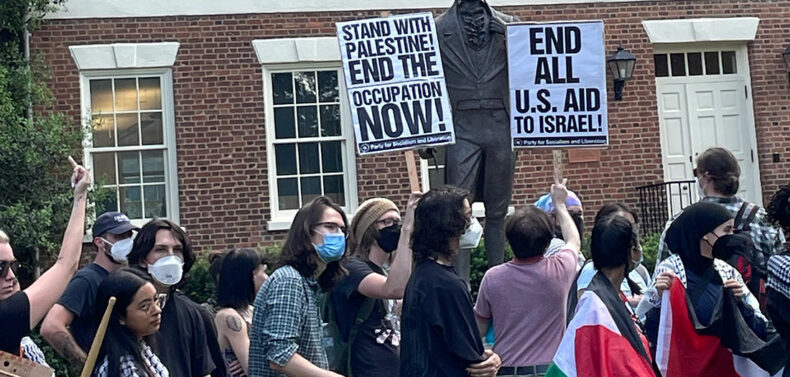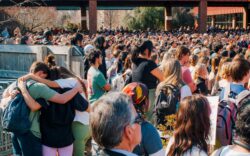Since late April, mass demonstrations against the Israel-Hamas war have swept across college campuses. Pro-Palestine protests have intensified as students demand that their universities divest from Israel and act to stop what they call a genocide occurring in Gaza.
After a series of occupation protests conducted by students at Columbia, Yale, the University of Southern California, Emory and more, students at UGA followed suit. On the morning of Apr. 29, 16 protesters were arrested on criminal trespassing charges after creating a “liberation zone” on the quad near Old College on North Campus. Nine among the 16 arrested were UGA students. They were all issued interim suspensions and barred from campus.
“The image of students getting forcibly arrested on their own campus while expressing their free speech was unsettling,” said fourth-year political science and history major Dan Catanese, who took classes on North Campus during the spring semester. “The actual actions of the students were non-disruptive, especially compared to the force with which they were removed.”
As the protesters linked arms that morning, campus police and state troopers physically separated them and placed them in handcuffs or zip ties before taking them to jail.
Catanese said the situation in Palestine is “incredibly concerning” as the U.S. continues to fund Israeli operations in Gaza, and that the new wave of protests reflects the public’s frustration and disgust with the national government. He said that there aren’t many serious pro-Palestine voices in positions of power, and this kind of direct action is necessary for those voices to be heard.
Fourth-year cognitive science major Simone Mba expressed the same sentiments. Mba said that protests exist to spread a message and to strike a chord in the government’s heart for change. In the case of pro-Palestine protests, students do not want money from the school’s endowment fund to be distributed toward companies actively supporting Israel, she said.
“It is extremely heartbreaking to witness a genocide happening in our present day and seeing how universities across the nation are finding ways to censor students by changing and enforcing policies that restrict our ability to protest such an issue as oddly divisive as this one,” Mba said.
Mba also said police used unnecessary force while arresting the students, and should have handled things better. Moreover, she said that the student protesters were given very little time to contest their suspensions, which in her opinion is an unethical way of carrying out discipline.
Others, like third-year human development and family science major Analiese Evans, believe that the recent protests caused disruption to the order of campus, and that UGA police were justified in their actions, especially after issuing multiple warnings that were ignored.
“I understand fighting for what’s right, like the freedom of speech and everything. However, if you’re asked to leave, I think the respectable thing to do is to pack up your stuff and not cause a scene, because that will create even more disruption and distrust in the police,” Evans said.
While Evans is against the idea of suspending the student protesters, thereby hindering them from receiving an education or graduating, she thinks detaining them was appropriate. She said that peaceful protests can occur with respect to other people and their surroundings, but setting up the encampments was clearly against university policy. In Evans’ perspective, many protesters are not thinking rationally because of the sensitive nature of the issue. Although she sees that these actions contribute toward an important cause, the protesters’ obtrusiveness ultimately overshadowed their good intentions, she said.
Since the occupation protest on North Campus, more than 200 UGA faculty members have signed on to a petition calling on the university to un-suspend the arrested students, citing a lack of due process. The university has not responded to the petition. However, in a May 2 open letter, administrators wrote that, “These individuals chose to be arrested, and they chose to resist arrest. They are all adults, and they consciously made these unfortunate decisions. But actions have consequences.”
The brief occupation occurred in an area where the university requires a permit to protest. UGA has “free speech zones” around campus, most notably outside the Tate Student Center. Students and others also often gather on Athens-Clarke County property near the Arch to protest.
Like what you just read? Support Flagpole by making a donation today. Every dollar you give helps fund our ongoing mission to provide Athens with quality, independent journalism.










